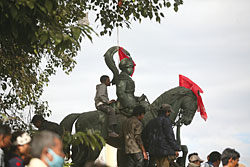 KIRAN PANDAY |
A day is a long time in politics, a decade is an eon. Ever since the beginning of the modern era in Nepal, major political changes have occurred almost every ten years. Following the overthrow of the Ranas in the 1950s, a succession of defining events such as the royal-military coup of 1960, the centralisation of political power in the 1970s, the plebiscite in 1980 and the restoration of parliamentary democracy in 1990 prepared Nepalis to expect 'something big' every ten years. But noone expected the magnitude of change of the past decade.
It's difficult to pinpoint the principal force that accelerated the march of history. But fissures in the old regime came to the surface in September 2000 when the Maoists attacked the Dolpa district headquarters even as soldiers at the Dunai barracks watched. Home Minister Govinda Raj Joshi was subsequently forced to resign for criticising the Royal Nepal Army.
The Dunai fiasco showed that the army was indeed a 'state within a state', a characterisation made by Harka Gurung during a closed door meeting (Issue #10) at the residence of Krishna Prasad Bhattarai. The former prime minister had said that the king once told him in no uncertain terms that his title of Supreme Commander-in-Chief of the RNA was not just ceremonial.
In December 2000, communal riots were sparked off by a statement purportedly made by Hrithik Roshan. In a week of madness following the false report, first the capital burnt, then its flames sparked retaliatory fires in the Tarai plains. The seed of the Madhesi-Pahadi divide were sown in the psyche of an entire generation.
The beginning of the end of the Shah dynasty began with the Narayanhiti Massacre of 1 June, 2001. The declaration of a republic in May 2008 was a mere formalisation of the decision of 1 February, 2005, when Gyanendra opted to be the CEO of the country rather than its king.
We will have to wait for the publication of the former king's memoir to discover whether the RNA had any role in his resolution to take the country back to the stone ages, but after the putsch, he became a virtual prisoner of the force under his own command.
The challenges of building a new Nepal remain more or less the same as those enumerated in this column (#400): writing a constitution that institutionalises reform, builds an inclusive Nepali identity, lays the groundwork of a national consensus and consciousness, and initiates the process of economic transformation. The monarchy is gone for good, but the twin threats of militancy and militarism cannot be faced if the political centre crumbles under the weight of its own contradictions.
Former Indian Prime Minister IK Gujral once remarked that he had read about revolutions only in history books and was privileged to have seen one unfold in Nepal. Since those also serve who wait and watch, we all were participants in the making of history. Being a columnist, I had a ringside view and saw who was fighting who from up close.
In military-speak, the media is a force multiplier that forms the public perception of a war, which then becomes the reality. It was not homemade guns that made the Maoists the most powerful leftwing insurgents in the world, it was the media that helped them look larger than life and then become what they were presented to be. It is interesting to note that the most ardent supporters of the Maoists in the past are their severest critics today.
To the everlasting shame of some of us in the media, Nepali journalism was either shallow, lazy or openly partisan. It did rise up when its freedoms were threatened, like after the 1 February royal coup, but soon lapsed back into complacency. The media failed repeatedly to perform the most basic function of any profession, "do no harm". Ironically, journalism has become an even more hazardous profession in the four years of volatile political transition since the war ended.
After a decade of pontificating about politics in this State of the State column, I will now try to shift the focus of this space towards analysing the media. Citizens may not be interested in the inner workings of the media, but the media is interested in us. That is why it needs to be watched.



